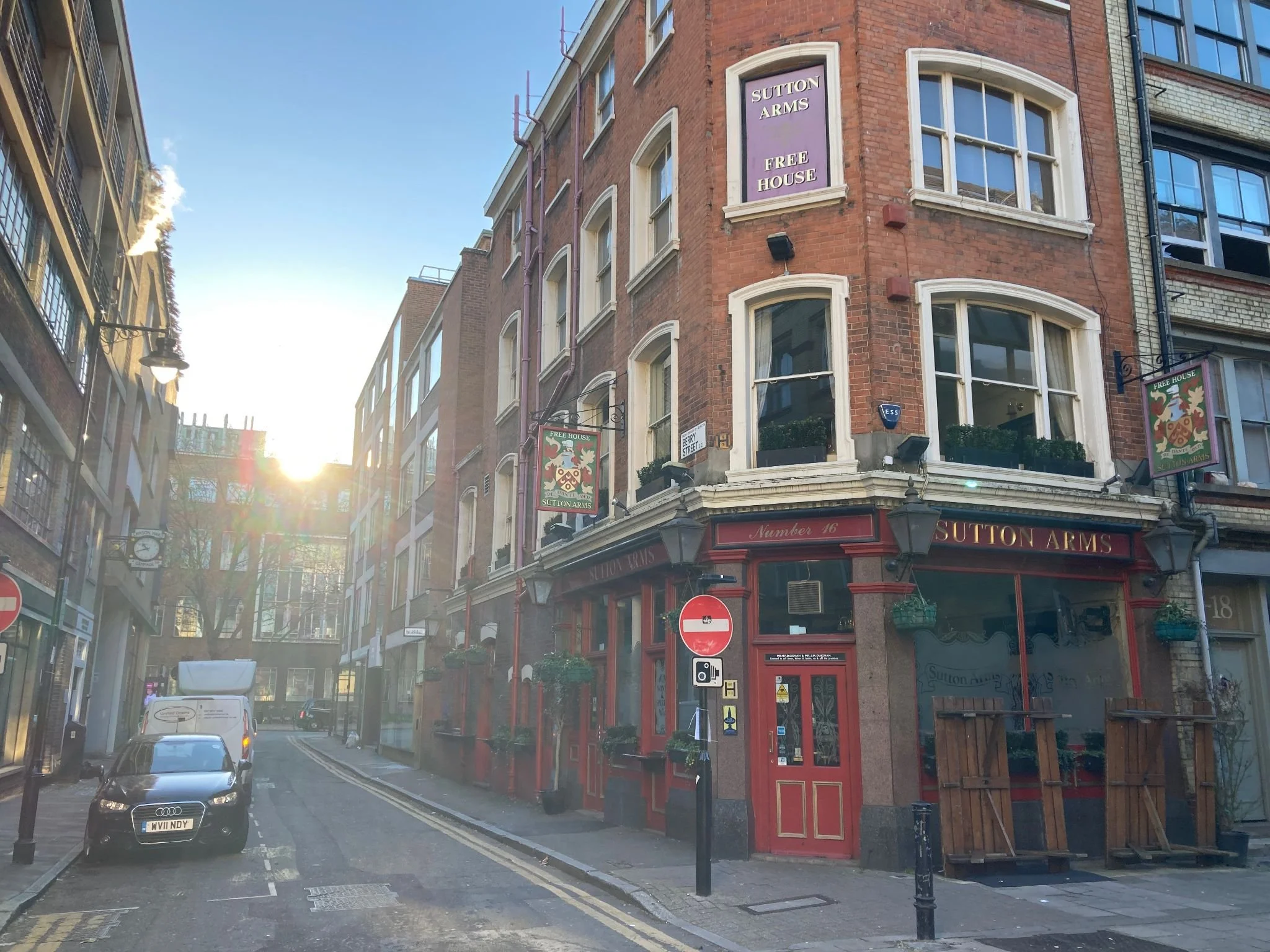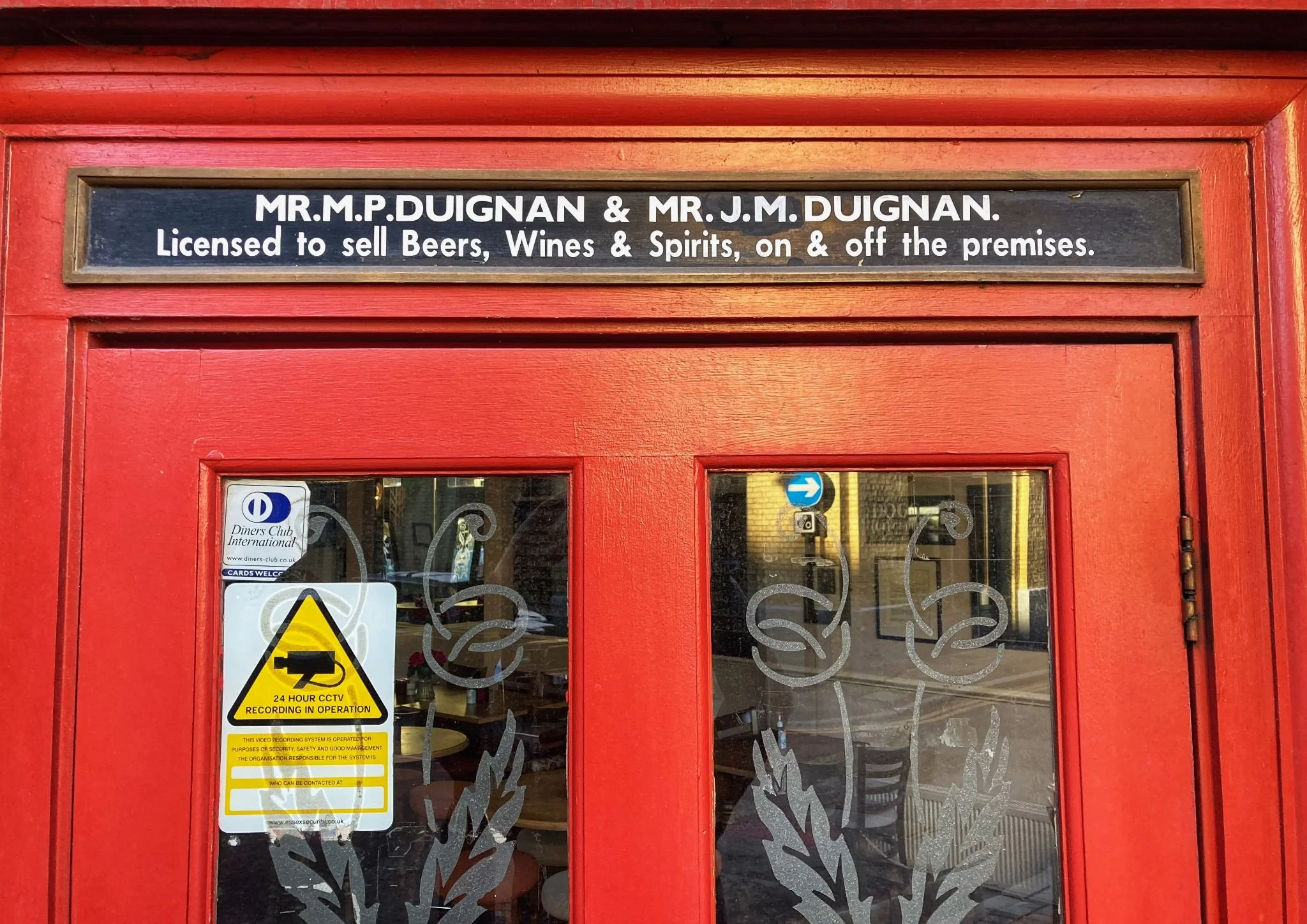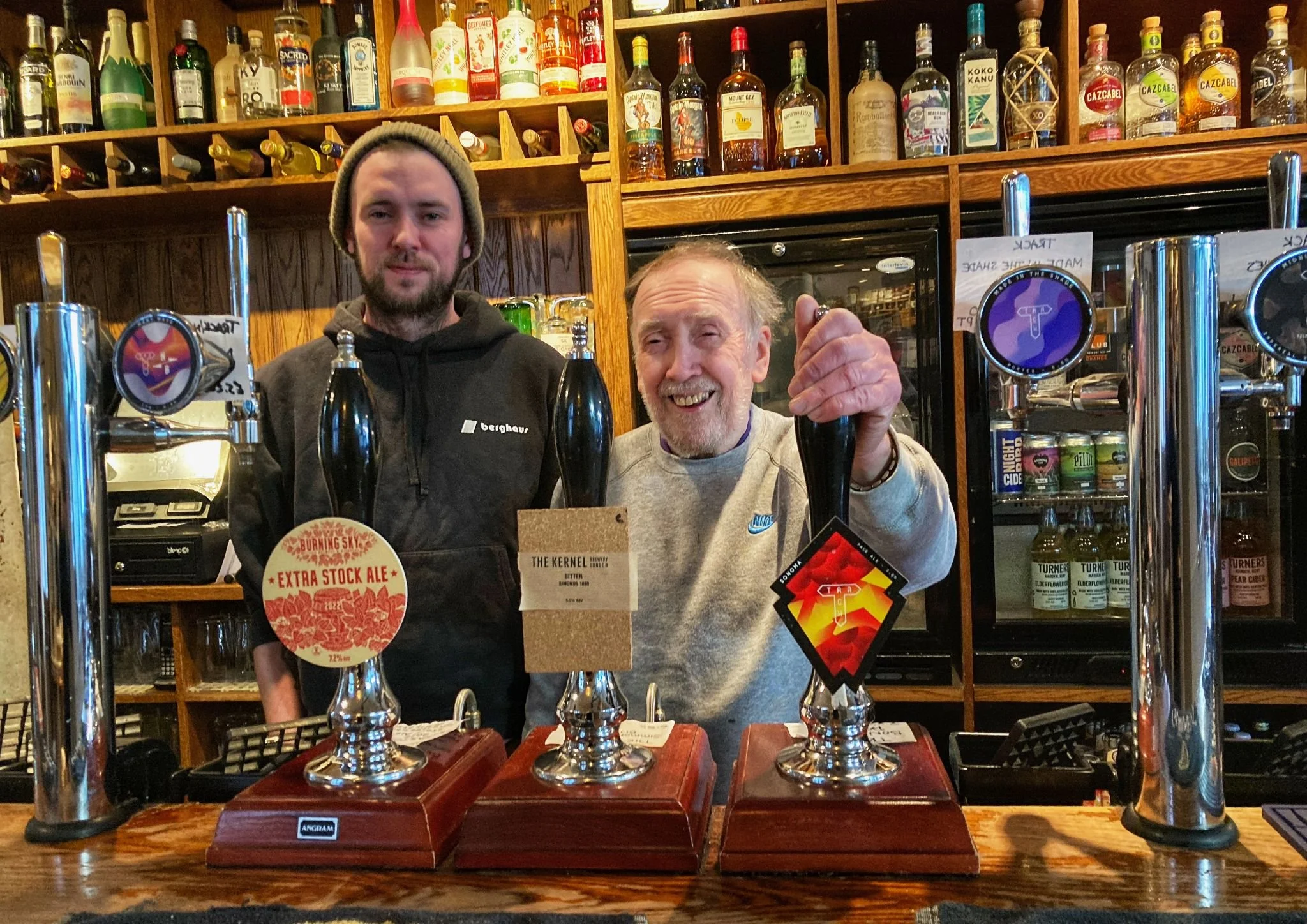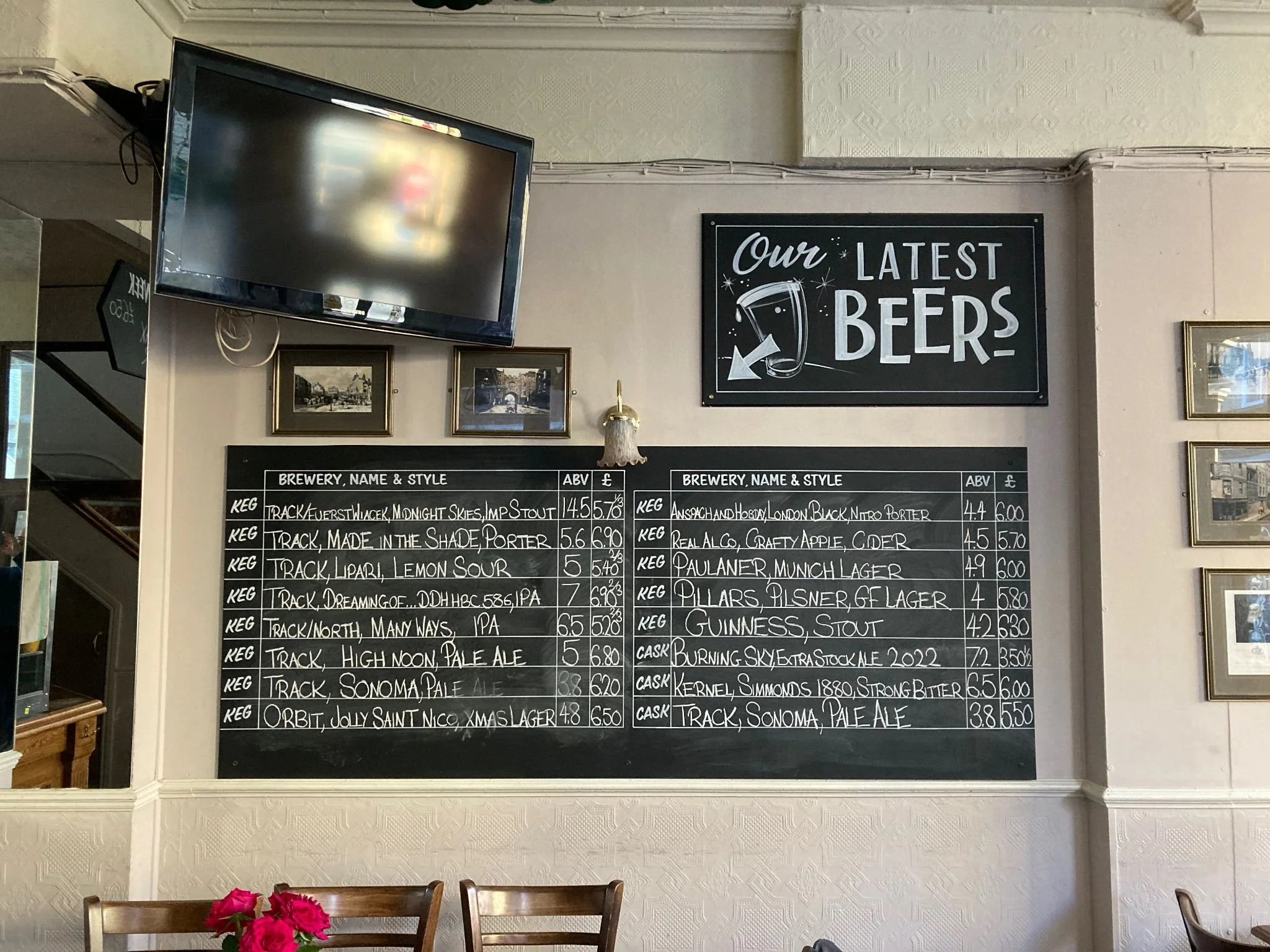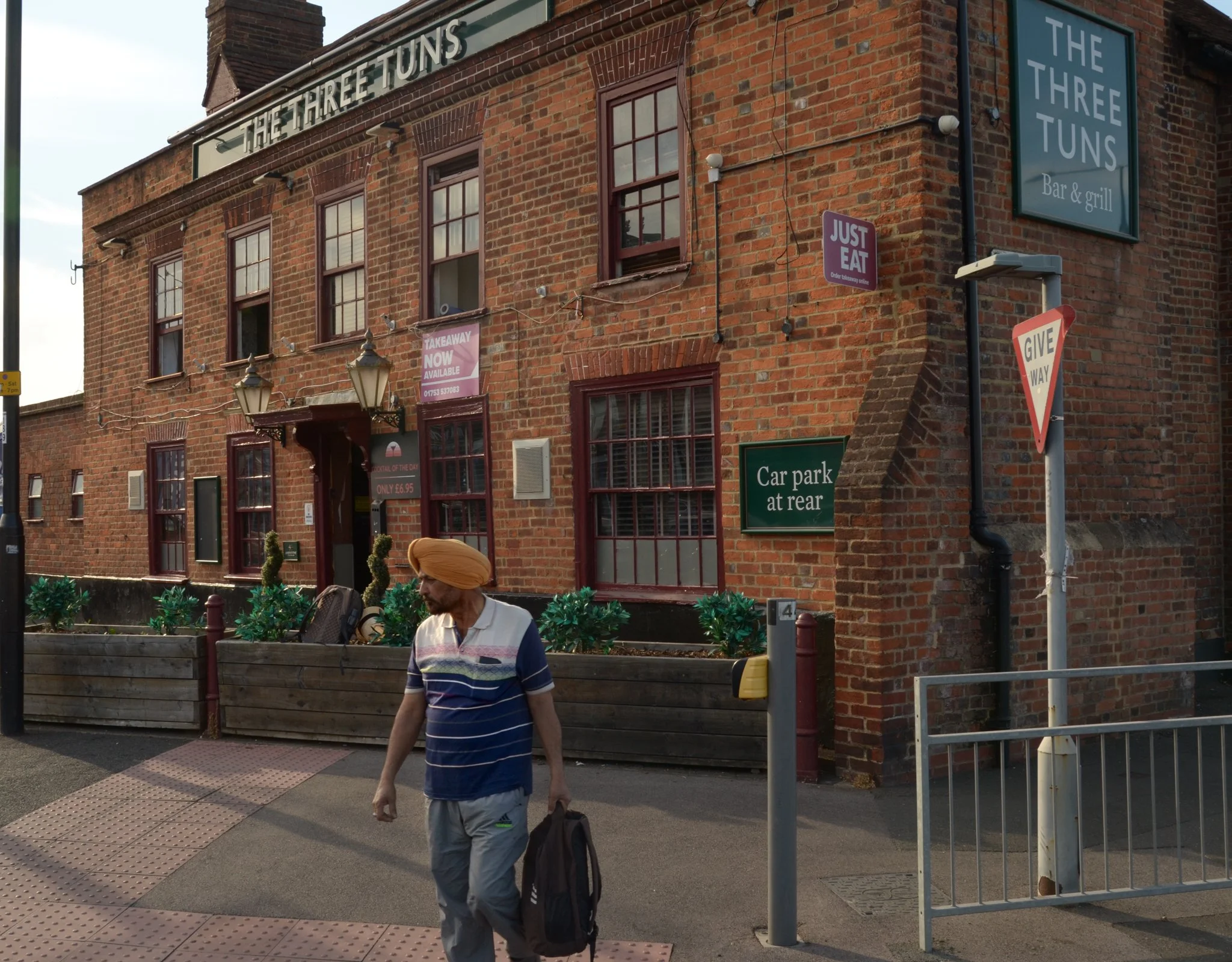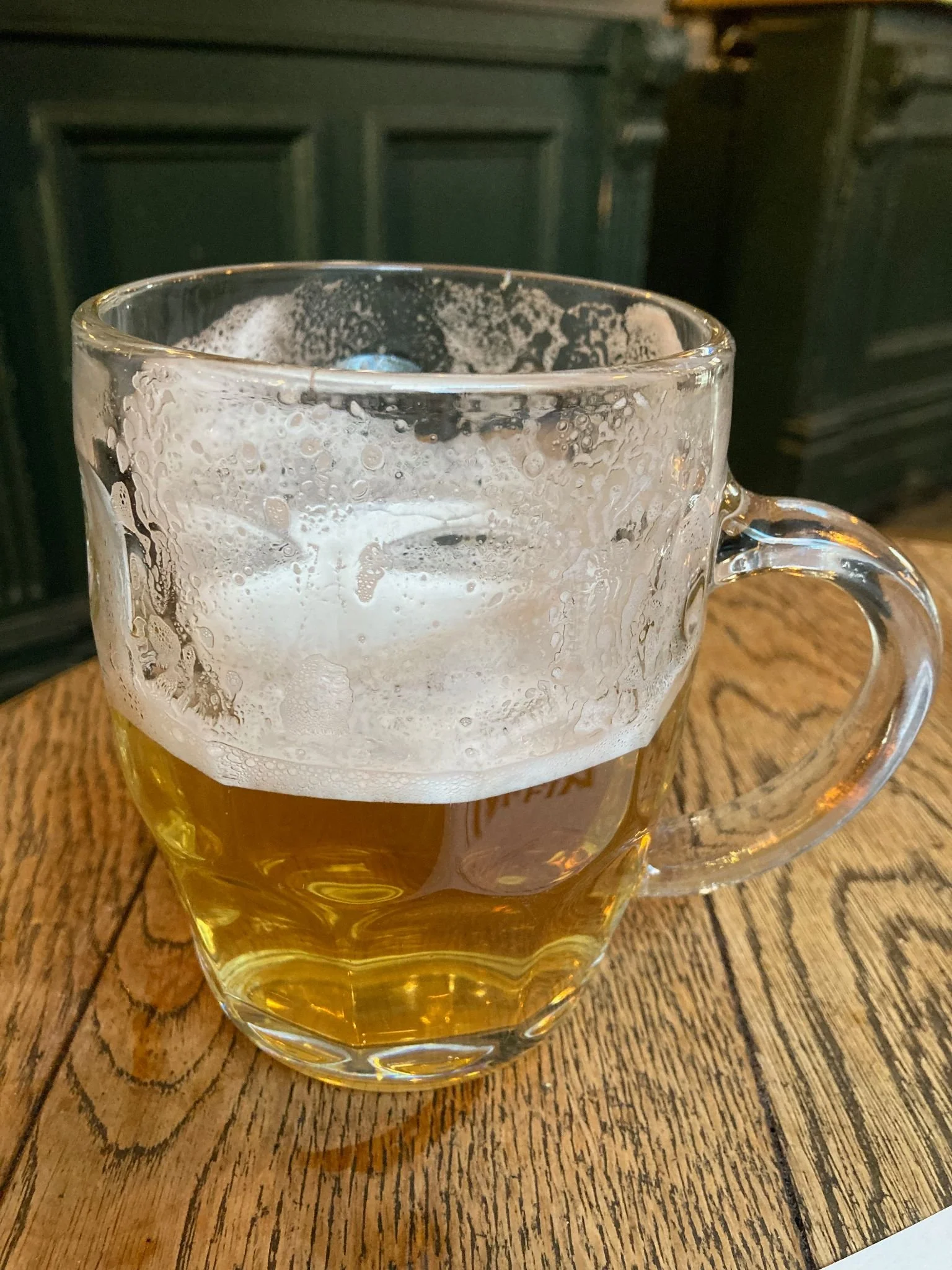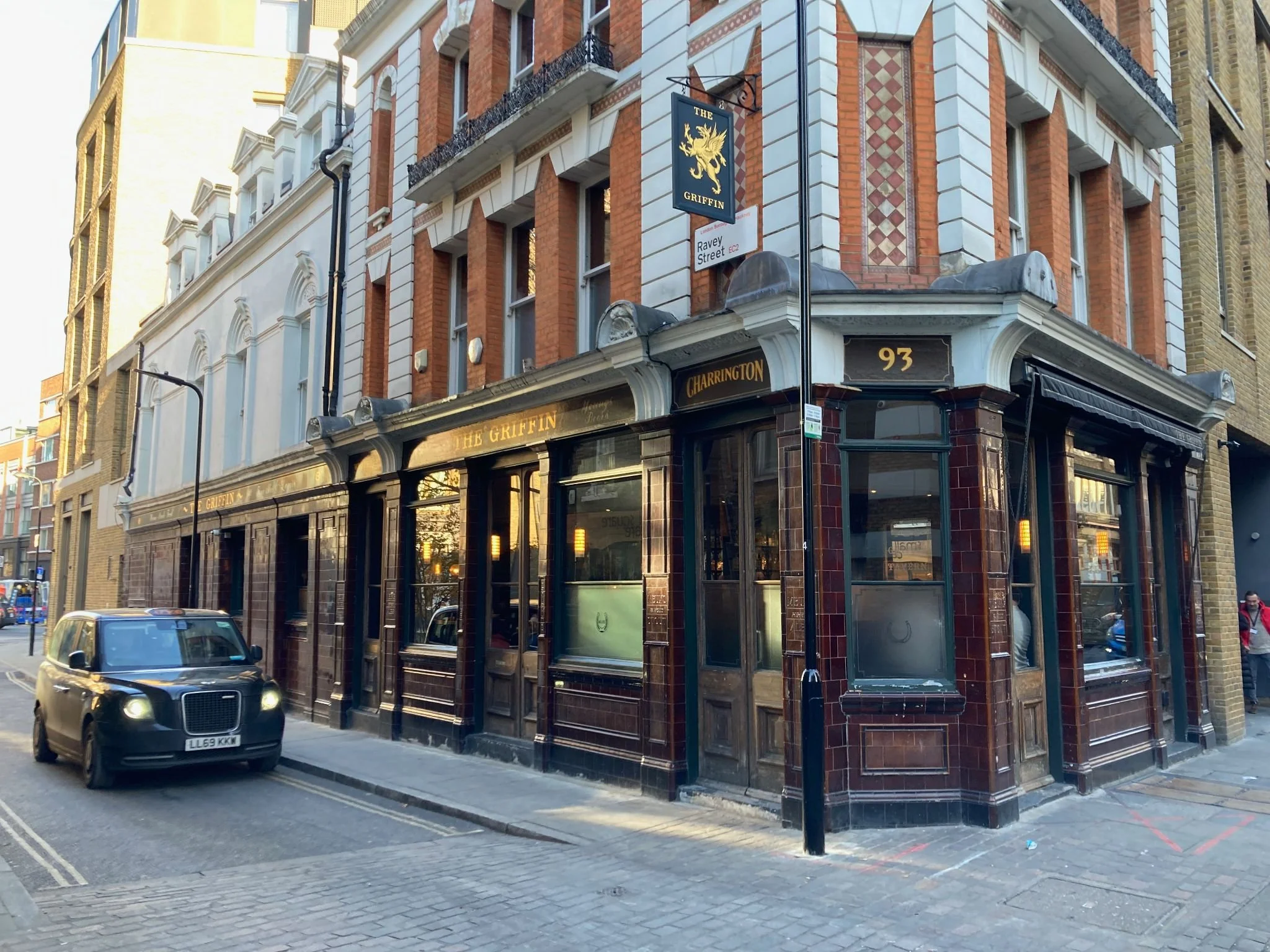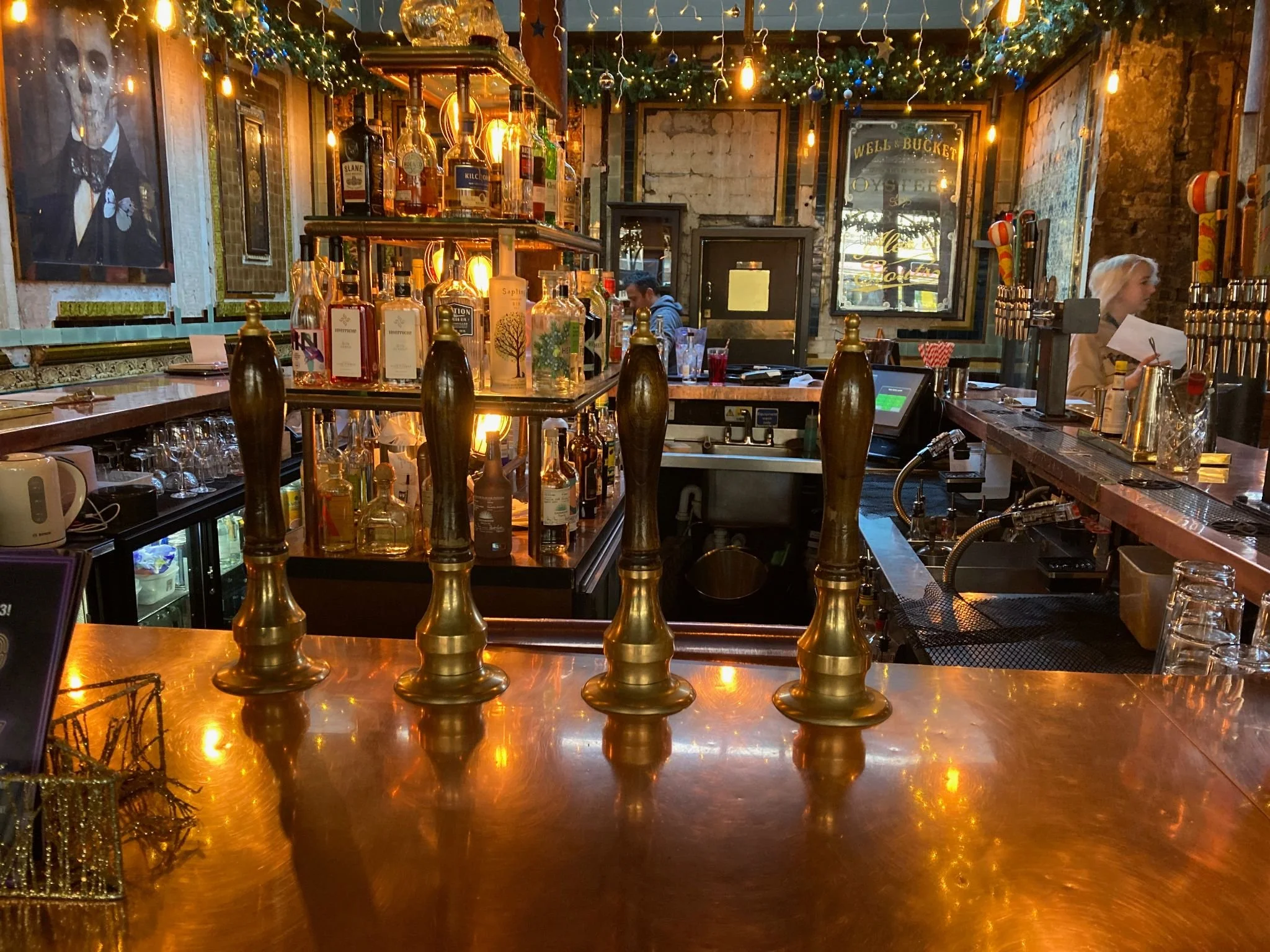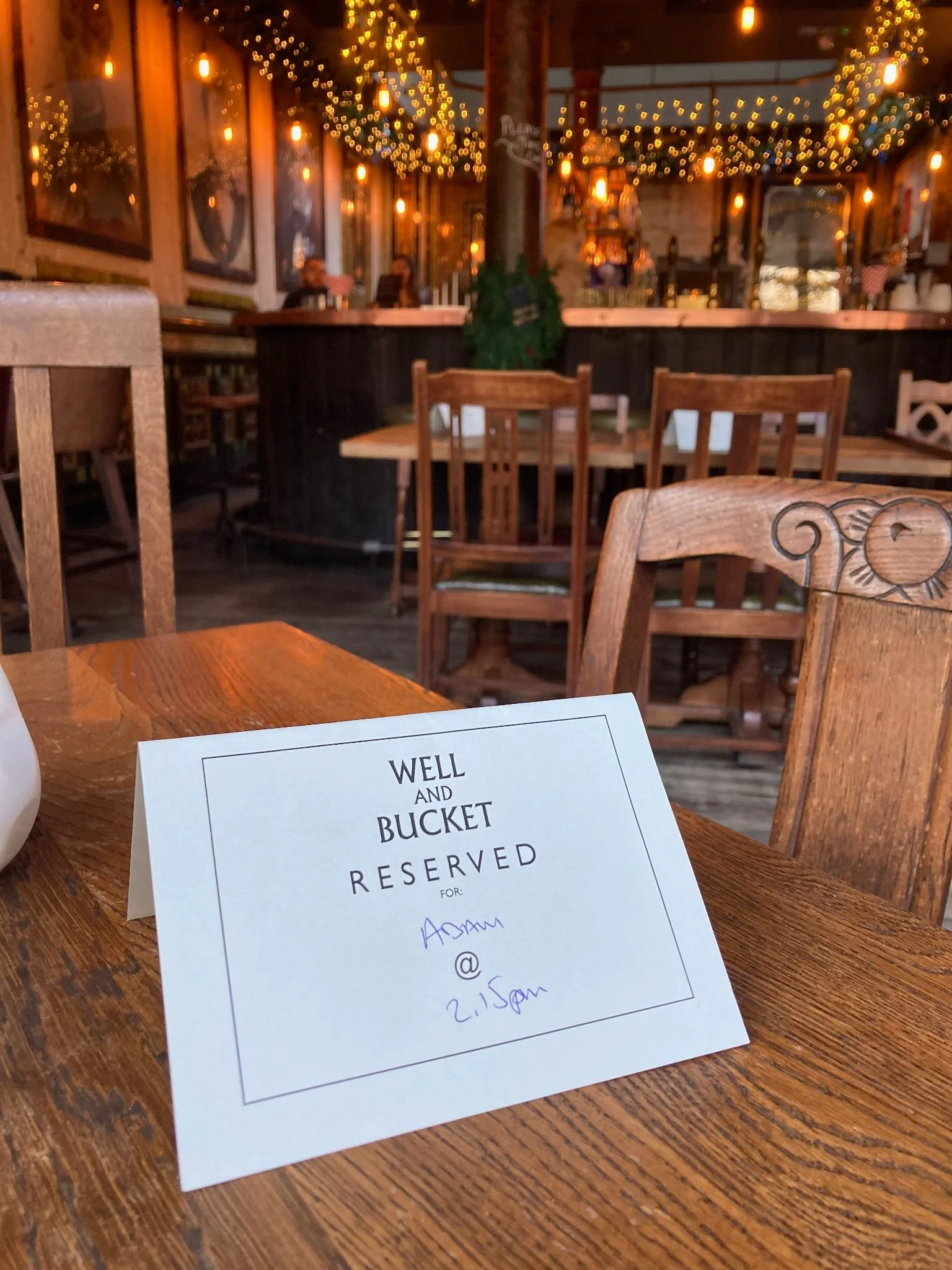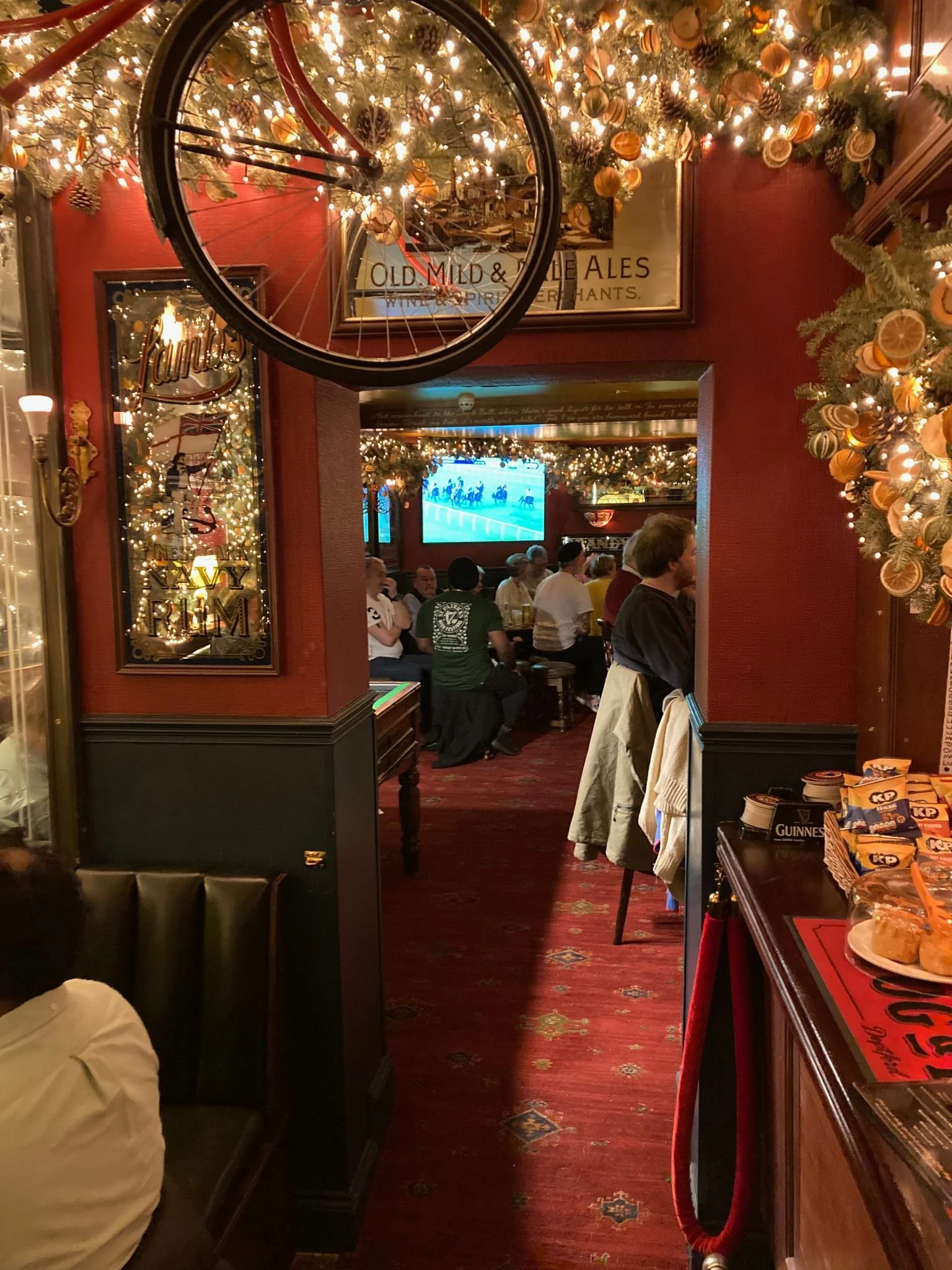January: Clerkenwell's Finest, Controversy in Covent Garden and Chowing Down in Slough
A monthly newsletter about London beer and pubs, (mostly) written by journalist Will Hawkes
The Generation Game
It’s the morning after his birthday celebrations and Jack Duignan is back in the pub. “It got a bit out of hand,” he says, a touch ruefully, as he drops the dog leads for his Boston Terriers, Ludo and Manny, and they hurry away, tussling and scrapping, across the scarlet-carpeted floor of The Sutton Arms in Clerkenwell.
10.30am on Thursday, a week and a bit before Christmas: too early for a restorative drink? Perhaps, but Jack, who’s turning 31, is not here for hair of the dog. His name is above the door, alongside that of his father, Mick. Jack was born upstairs, in the pub his dad has run since the 1980s, in a part of the city where his family is steeped in the trade: cousin David runs The Old Fountain near Old Street, a similarly well-run, much-loved establishment.
Wednesday evening’s events - which included beer from Manchester’s excellent Track Brewing Co and music from brass ensemble the Tromboners - demonstrate exactly why this handsome street-corner pub has captured the imagination of London’s beer world. The Sutton Arms is an irresistible blend of old and new, a traditional, no airs-and-graces pub that sells excellent beer from the UK’s best breweries. In the post-Covid era, when even the most demanding of beer aficionados craves some old-fashioned comfort, that is an unbeatable combination.
It’s not the only potent pairing here. Jack is responsible for what’s available on the bar - but we’ll get to that later. Mick, now 74, is the main attraction for many of their customers, with a pub heritage that stretches back more than 40 years and the sort of chat that turns a pint into a real pleasure. He took charge of his first pub, The Hansler Arms in King’s Cross, in 1979, after an extensive interview process with owners Whitbread, and thanks to a CV that drew heavily and a little creatively on the family connection to the Old Fountain.
It was a great place, as Mick tells it. Stories pour out of him: the Scottish football fans who took up residence during Home Championship games at Wembley, the coppers from King’s Cross Police station, across the road, who shared the pub with a diverse case of ne'er-do-wells, and the first cask ale he ever served: Flower’s Original. “It was cloudy, hazy. I thought - what am I doing wrong?” He soon got the hang of it.
Born in Hackney in 1948 to parents from Roscommon in the heart of Ireland, Mick took on the Sutton Arms, just off Clerkenwell Road, in 1989. (The Hansler Arms is now shut, commemorated with a framed article about it by Roger Protz on the wall at the Sutton Arms). He can remember when he signed the lease on the pub because it came just before Arsenal’s unforgettable Title triumph in 1989, when the famous Anfield victory was shown on a TV propped up on the pool table (which, like most pool tables in London, is now long gone).
The celebrations went on long into the night, so Mick was a little worse for wear when a famous face was first through the door the next morning. “I had a diabolical hangover, I was in a right state,” he says. “I was told - ‘Robert De Niro’s in the bar, sitting on his own’. Oh fuck off! But he was; his girlfriend at the time was working at a film studio down the road, I think. He had half a bitter, the first one out of the pump that morning.
“He drank about that much [Mick puts finger and thumb together to show about half an inch] and brought it back. It was too warm. He had half a lager instead. He was much happier with that.”
Then there’s Rod Stewart - smart suit, drank Bitter, two pals who were probably bodyguards - and the puppeteer who left Margaret Thatcher’s Spitting Image doll in the pub when he rushed off to pick something up, with inevitable consequences. Mick’s regulars back then were printers, journalists from the nearby Reuters building, workers from various local businesses - all now gone, more or less, but the Sutton Arms, unlike too many London pubs, has found a way to survive.
There was no inevitability, though, that Jack would join his father at the pub. As a 10-year-old, he collected bottles until he realised £1 a shift was a “rip-off”, and he was on West Ham’s books (Mick thinks the Hammers made a mistake letting him go; his other son, Greg, also played youth football, for Orient. Jack is still a passionate West Ham fan, with both dogs named after players). He fancied a job selling trainers, but his Dad convinced him to give the pub a go.
It didn’t start well. In fact, as Jack puts it, he “hated it”, but it sparked an interest in beer. On nights out, his friends would drink Foster’s, but he’d be trying different things; Belgian beers, American beers. At that time the pub sold a fairly classic selection - Stella, Guinness, London Pride - but Jack’s advocacy convinced Mick to put Vedett IPA on a spare tap. Soon they were selling ten 20-litre kegs a week, and so another tap was converted to guest beers, sourced from Cave Direct.
Things have accelerated since. There are 16 beers on the bar now, up from eight (three are cask, and there are excellent pies). The biggest names (and biggest sellers) are Paulaner and Guinness, the latter the one beer from the past that they couldn’t say goodbye to. It just sells too well. It doesn’t matter what the price is (and it’s been going up a lot lately, grumbles Jack), people will pay it.
Mick still lives upstairs but Jack has moved to Leyton. He needs the distance. Growing up in a pub wasn’t always easy, he says: “We never had a normal life. I still have scars on my arm from when I was eight or nine, coming home, walking through the pub, and people were putting their fags out on you by accident.” He pauses to consider what he’s just said. “Jesus Christ!”
A lot has changed since then. Jack’s seen it first-hand, from the rise of Beavertown (“People ask us for whatever we have that’s most like Neck Oil or Gamma Ray”) to the resistance he got when he wanted to take Stella off the bar, to the value of lockdown, which was a surprise boon for The Sutton Arms. It helped the pub to engage with people, breweries and customers who came by to pick up beer.
So what’s next? Jack wants to do something else in the beer world, in addition to the pub; Mick is keen to keep doing what he’s always done. “I work for Jack now,” he says. “I don’t want to stop working, especially when it’s like this. I like the daytime, getting things ready, making sure the cellar looks good. I’m a creature of habit; call it what you want, I like doing things properly.”
Call it what you want, indeed. Whatever it is, it appears to be just what London’s beer lovers are looking for right now.
……………
Luck and Judgement
Lucky Saint, the London-based non-alcoholic lager brand, is powering ahead. The company, whose unfiltered lager is made in Bavaria, has just raised £10m from investors, and you can see why. The beer is not only very good but intensively marketed too, with the result that it’s available pretty much everywhere, from supermarkets to restaurants - and soon there’ll be another venue stocking it.
Lucky Saint’s very own pub, in fact. The company is planning to open in Marylebone, where its offices are based; a new company, called the Lucky Saint Pub Co, has been established, boasting the same two directors that run the beer company (although founder Luke Boase’s name is spelt incorrectly).
The word is that they’re planning to serve alcoholic as well as non-alcoholic drinks. That would be a smart move: remember Brewdog’s alcohol-free bar in Old Street, which opened with a bang before very quickly closing with a pop?
……………
Desi Pub of the Month: The Three Tuns, Slough
In his latest column, David Jesudason, author of the soon-to-be-published Desi Pubs, finds unexpected delight beyond the boundaries of Greater London:
Liking Desi Pubs often takes me out of my comfort zone. Before I became obsessed with them, I thought I was a metropolitan type who only felt at ease in a city setting. Or maybe my love started because of how fresh they felt compared to the type of pubs I had started to become numb to: expensive gastropubs or craft-centric ones with whitesplaining staff (I’m bored of nodding along when someone tells me about an IPA’s origins).
I wasn’t sure what I was to expect when I travelled to Smethwick or even parts of West London, like Hounslow. It’s easy to have misconceptions of places like these and, embarrassingly, I was really prejudiced about Slough even though you can travel there using contactless payment making it feel like an extension of this city. I thought it was a white, naff backwater as shown in The Office but the reality is it’s a young, super diverse place with a desi pub, The Three Tuns, that’s a beacon for South Asians from all over the country. It used to be a dangerous dive but now it has wonderful fusion food (keema nachos!) and lively bhangra nights. Ironically, its biggest customer base is the Slough Trading Estate so if The Office was realistic then you’d have seen David Brent dancing to Punjabi pop.
David’s book, Desi Pubs, comes out in May. Pre-order it here.
……………
A Tonic for London Beer City readers
One of the best magazines to have emerged of late is Tonic, a biannual celebration of drinks and travel. I have a particular reason to love this marvellous mag: a story I wrote in its first issue, about The Oberpfalz in Bavaria and its communal lager-brewing tradition, helped me win the Fortnum and Mason Drink Writer of the Year award in 2021.
Now you can have a copy of that first issue, entirely for free, courtesy of the generous Londoners - Benita Finanzio and Rob Ellison - behind the publication. Simply head to the Tonic webshop and add LONDONBEERCITY to the discount code box to get your free copy (If you’re outside the UK, you’ll have to pay postage). And that’s not all. Tonic is also offering a 20 percent discount on subscriptions. Go to the subscription page and add LONDONBEERCITY20 to the discount code box to get your discount.
……………
Two Pubs, One City
The Griffin, Shoreditch; The Well & Bucket, Bethnal Green Road
There’s one cask ale on at The Griffin, a slim, aubergine-tiled pub just off Great Eastern Street in Shoreditch, and I’m the first to order it. It’s 12.20pm.
The serving process proves surprisingly complex. First, the barman peels cling film from the nozzle, and then pours perhaps an inch of beer into a small glass. He tastes it, is apparently satisfied, and begins to pour a full pint into a dimpled jug. Then he stops again, tastes that, puts it to one side, and attaches a sparkler to the nozzle. A new jug is filled and placed on the bar in front of me.
It’s Oakham Citra (£5). Given the rigmarole, I’m sceptical - but I needn’t be. It’s absolutely delicious, as good as I’ve had it in years. The beer is hoppy (raspingly bitter at this early hour, actually) and well-conditioned enough to survive a thorough sparkling. Some people talk disparagingly of beers that ‘taste like grapefruit’ - but that’s what this tastes like, and it’s superb. One-note, but superb.
I feel the same way about the pub. It’s a very satisfying space: two doors into the street swinging open and shut, etched mirrors, the corridor-like slimness of the room. Even the men’s loos, home to two of the best urinals in town, are marvellous. It just lacks the welcoming ambiance a proper landlord/lady would give it (see Sutton Arms, above), but otherwise it’s a joy.
Until recently this pub was owned by pub company Barworks, a key player in London's beer revolution. Established in 1998, Barworks really got into its stride with the arrival of craft beer: the founders (one of whom, Andreas Akerlund, is a friend of mine) invested in the Camden Town brewery and built a family of beer-focused pubs in East and North London, including The Exmouth Arms in Exmouth Market and The Three Johns in Angel. These were good pubs of a modern kind, offering often excellent beer in elegant surroundings.
In 2021, though, the company sold 13 pubs - including The Griffin - to another company, Urban Pubs and Bars. For London’s beer drinkers, this was one of the most significant changes wrought by, or at least during, Covid. While Barworks were committed to modern beer, Urban Pubs seem less so. It’s a changing of the guard, an ill wind - so I’m told - for beer lovers in this city.
That’s not immediately obvious at The Griffin. There’s only one cask ale, true, but it’s in excellent shape. There are keg beers by Burning Sky, Boundary, Burnt Mill and other independent breweries on the bar, there’s Schneider Weisse and Saison Dupont. A lot of good beer by anyone’s standards.
This lunchtime, though, they’re all struggling to compete with Guinness, which is flying across the bar on a day when the temperature outside is just below freezing (both barmen are wearing woolly hats, and not solely for sartorial reasons). About half of the pub’s 20-odd customers are drinking it.
You wouldn’t think this was its natural audience, but it’s clearly having ‘a moment’, as they say. This is a well-heeled crowd, as befits modern Shoreditch. The music is loud. There are lots of puffa jackets with fur-lined hoods, and only one suit. An older gent is wearing a gilet on top of a pink shirt, with chinos. It’s mostly men, although there is one young woman in a Santa hat. The atmosphere is festive, relaxed. It’s lunchtime drinking just before Christmas.
Three posh men wander past as I get up to leave. “Yah, we were out with Ben Howard and that gang … no, in Soho.”
A ten-minute walk eastwards takes me to the Well and Bucket, another Barworks-turned-Urban pub. I wander past The Old Blue Last and The Queen’s Head, one more Urban venue, which until September last year was home to Goose Island’s London brewpub (that must be it for Goose Island venues in London, surely?).
The Well and Bucket has changed a lot more than The Griffin, and not necessarily for the better. There are four handpumps on the bar, none in use. There are new tables around which you must manoeuvre to get to the bar, not a good sign in a pub. The tables are much smaller than they were, too, and most of them have reserved tickets on them. The message is clear: this is a pub for diners now.
There is beer, though, even if - with the exception of Signature - it’s drawn exclusively from brands owned or recently sold by the big boys: Camden, Brixton, Magic Rock, Fourpure. I order a pint of Camden Hells (£5.90), which is decent but a bit too cold given the outside temperature, and take a seat at a table by the front window.
I’d better be quick: a note informs me that it will be occupied by Adam - and three pals, presumably - at 2.15pm. I suspect they’ll be enjoying much the same experience as a table to my right, where 12 colleagues are working their way through an office Christmas lunch. It’s early and the ambiance is subdued, despite the multicoloured paper hats most are wearing. (On the other side of the pub, incongruously, two men are huffing and puffing as they remove a long, low bottle fridge.)
Xmas has arrived here in a way it hasn’t at The Griffin. The room smells of Christmas Dinner; there are lots of decorations. Physically a lot of what was here before remains, including some gruesome images on the left-hand wall as you come in, and a painted mirror at the back boasting that the pub is ‘noted for oysters and porter’. Not any more it isn’t. There are no oysters (the menu is generic gastropub: burgers, sausage rolls, etc) and Guinness is the only dark beer, but that’s surely not worthy of note. Everywhere sells it.
As I drink up, two women enter, and order pints of Neck Oil. A young man follows, dressed in a Santa Claus jumper, and checks the names on the tables. It’s these ones, he turns to tell his friends. He’s Adam. It’s time for me to go.
……………
One Mile, End
Things continue to look pretty gloomy in the brewing world. Businesses are closing up and down the country, including a number in London: Canopy, Solvay Society and, most recently, One Mile End. The latter had particular resonance for me. Back in the days when London Beer City was a beer week rather than a newsletter, One Mile End were enthusiastic participants, especially Simon McCabe, the genial Middlebrough-raised head brewer (pictured below in 2017), who subsequently and sensibly headed for Finland. (He now makes wine as well as beer, and appears on magazine covers.)
Elsewhere, there’s a London departure and a revival, of sorts. London Beer Factory has left the SE27 industrial estate it shared with Gipsy Hill Brewing, and - according to Des de Moor - is now making beer in Norfolk. More on that when we have it.
Brodie’s, meanwhile, which played as key a role as anyone in kicking off London’s beer revolution, is back, albeit not in the capital. Once based at Leyton’s William IV pub, the beer will now be made in Hereford, by Tom Barlow, the former Brodies head brewer gifted the brand by founder James Brodie in 2018. “Expect plenty of cask beer, clear beer - no haze here! - and fun,” he tells me.
……………
And its Burns, Burns, Burns
One of the best foods around is Haggis, a savoury pudding so delicious vegetarians have rightly demanded - and got - their own version of it. It’s the undoubted main event at any self-respecting Burns Supper, of which there are dozens going on in London later this month. This might be the most fun, though: There’s Yer Supper, at the Pembury Tavern in Hackney on the 25th of January. Attendees can expect London-brewed beer from Five Points, Finnish whiskey and haggis pizza, all for £25.
……………
The Needle and The Spoons
Fun times in Covent Garden, where Wetherspoons are facing considerable local opposition as they seek to turn the former TGI Friday’s on Bedford Street into a pub. Spoons, which recently announced plans for a pub & 3,800-square-foot beer garden at the O2, is under fire over the proposed opening hours: 8am until midnight, which doesn’t seem unreasonable in the centre of Western Europe’s biggest city.
“The change of use from a restaurant to a pub would encourage a different clientele, drink led rather than food led,” writes one local just about subduing an attack of the vapours, in a submission to Westminster Council. “This is wholly inconsistent with the character of the area.”
I’m not the biggest advocate of Tim Martin’s pubs - they’re often cheap, it’s true, but they never quite hit the mark - but this seems to be about snobbery as much as anything else. Covent Garden has been for drinking at all hours since Shakespeare was a boy. A decision by Westminster Council on whether to approve Spoon’s planning application is expected soon.
……………
Dog Learns New Tricks
Finally, one of South London’s best pubs has just got a little bit better. The Dog and Bell in Deptford has added a new room, which takes in a curved bar, a bar billiards table and a TV (invariably showing horseracing). When I spotted it on New Year’s Eve I thought I was seeing things. “Narnia,” is how one observer put it.
And finally finally: Not too far from there, in Bermondsey, there’s further good news. The Old Justice, which we mentioned in last month’s newsletter, has new owners. Good luck to them.
……………
London Beer City is written by journalist Will Hawkes. If you’ve got a story or an observation, contact me on londonbeercity@gmail.com. If you like what you’ve read, please share it with your friends; if you’ve been forwarded this email and enjoyed it, you can sign up here. Thanks for reading.

